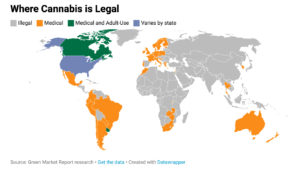
By Andrew Ward
Global cannabis reform is gaining momentum. What started as a ripple in three countries has become a global policy movement.
While many countries, primarily in Africa and Asia, continue to ban cannabis, a hotbed of reform activity is transpiring everywhere else.
Stateside, U.S. cannabis advocates continue to push for federal and local reform. Simultaneously, notable international cases, including that of WNBA star Brittney Griner, remind us that even though reform is underway, it is far from the endpoint proponents would like to reach.
International Reform Gaining Steam
Global cannabis reform continues to gain momentum via various regulatory frameworks and proposals.

“The majority of the world appears to be moving towards some form of cannabis regulation, with an eye towards liberalization,” said Jason Adelstone, an associate attorney for Vicente Sederberg.
Adelstone, whose focus areas include cannabis compliance and international policy, added, “What those systems look like can vary greatly.”
Depending on the nation, programs vary from permissive medical regulations to heavily regulated, GMP-style pharmaceutical markets. Medical and export-only models, such as that seen in Lesotho, are popular legislative approaches. In South Korea, cannabis-based drugs Epidiolex and Sativex are approved in some instances.
Mexico and South Africa have taken different approaches, legalizing cannabis via Supreme Court rulings. Neither passed laws through their legislative bodies.
Lewis Koski, chief strategy officer for Metrc, believes the approaches being taken by Malta and Luxembourg could offer an alternative model with credentialed companies spanning cultivators to social clubs. Both countries passed reform laws in 2021.
While activity continues, demand for information is reportedly growing before significant change is made in other markets. “There’s a real interest in hearing from other countries, companies, and experts that have experienced it differently around the world,” Koski said.
RELATED: Are Bad Actors In Cannabis On The Decline?
Right now, all eyes are on Germany. Proposed regulations were released and approved by the Federal Cabinet earlier in November, but reform efforts could be halted by the European Union, where politicians opposed to legalization have been lobbying against the measure.
Other European countries, including the Netherlands and Portugal, have passed cannabis or drug reform laws in previous years but did not fully legalize the plant.
Michael Sassano, founder and CEO of EU-based pharmaceutical and biotech company Somai Pharmaceuticals, said medical is “clearly the easier road” to legalization. Still, news from Germany has surrounding health ministers on notice.

“The big question isn’t if cannabis will increase globally; it’s simply a matter of rules to open access to patients and adult use,” Sassano said.
Adelstone mentioned that additional countries, including the Czech Republic and Ireland, could soon join Germany in passing cannabis reform laws.
Susanne Caspar, CEO of Swiss-based botanical extract producer Linnea, feels “great progress” is underway. Switzerland’s progress includes legalizing medical cannabis this past summer.
Expanded access emboldened Linnea, a 40-year-old brand, to expand into the cannabinoid marketplace further, Caspar said. As more nations consider reform, she urges lawmakers to consider the various needs of the market when creating regulations.
“The needs of the medical patient and the recreational customer are not interchangeable,” stated Caspar.
Federal Movement in the U.S.
Back in the United States, two states, Maryland and Missouri, passed legalization ballot initiatives in November. Three other states — Arkansas, North Dakota, and South Dakota — rejected their ballot measures, a distinct swing away from the green wave experienced two years ago.
Another hotbed of movement is New York. Ryan Kocot, a cannabis attorney licensed in California, Massachusetts, and New York, is interested to see if the Empire State’s model will shut out multi-state operators as some say the plan suggests.
RELATED: Will New York Be Able To Control Its Underground Market?
“There may be some unintended consequences, but the intention is to give smaller operators a chance,” he said.
The impact of that effort is to be determined. A mid-November lawsuit from an out-of-state retailer temporarily halted license issuances in five regions, including Brooklyn. The case, brought by Michigan-based Variscite NY One, contests New York’s CAURD program and its priority licensing for drug war victims.

For now, reform at the national level continues to be a wait-and-see game. Rumors about SAFE Banking Bill passing during the Congressional lame-duck swirl. If the U.S. does pass a significant piece of legislation, Sassano feels nearby nations could follow suit.
“South America will flip when the USA gets their federal act together,” he said. That continent has seen a flurry of medical laws implemented in several countries in recent years.
Boundaries of Legalization
Meanwhile, the Biden administration took action in October to correct damage caused by the War on Drugs, pardoning thousands who were convicted of simple federal cannabis possession. The move has split opinions.
Dr. Chanda Macias, CEO of Ilera Holistic Healthcare, approved. She said the action “sent a strong signal to the whole world the direction that the U.S. is headed towards in its cannabis policy, and hopefully, it’s a direction other countries will follow.”
David Holland, a cannabis attorney, wasn’t as sure. Holland, who has worked with federal regulators for more than 30 years, said he couldn’t recall a simple federal possession case.
“It’s such a small group of people,” he said of the roughly 6,500 records reportedly affected by the decision.
However, the action also drew attention to the struggles of individuals convicted in outside the U.S. border. Cases like Griner’s have bred numerous public discussions about the collision between international and U.S. policy.
Calls for the release of Griner and similar individuals serving international cannabis sentences have grown recently. In November, Griner was transferred to a penal colony in Mordovia, Russia, to serve her nine-year sentence.
Kassia Graham, director of community and strategy for Cannaclusive, feels the ruling highlights the ongoing global drug war.
“As too many countries are enmeshed in the war on drugs, they have archaic rules that are an affront to a modern and informed society,” she said.
Holland feels Griner’s situation, which began during the onset of the recent U.S.-Russia-Ukraine tensions, isn’t a cannabis charge at its core.
“She’s a political prisoner,” Holland stated.
This article originally appeared on Green Market Report and has been reposted with permission.





